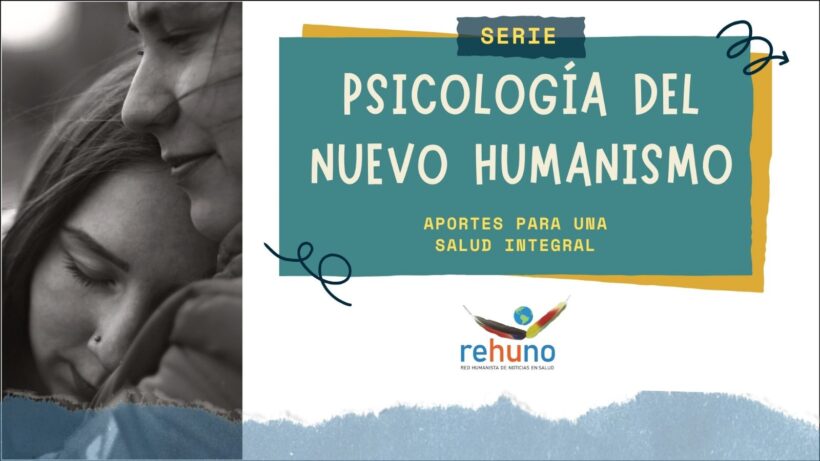From the Humanist Health News Network REHUNO Health we set up a place of exchange where we find a new look on daily life based on an experiential and existential psychology (the Psychology of New Humanism), and which gives some concrete proposals of personal work to reach a full sense of our existence and a life free of unnecessary suffering.
It is not, therefore, a therapeutic psychology, nor does it deal with any pathology, but is aimed at anyone who wants to understand themselves and have the tools, if they so wish, to initiate a positive change in their lives. Psychological wellbeing is undoubtedly one of the foundations of integral health, which is why it is an aspect that needs to be addressed. We invite you to put these proposals into practice and also to contact us and tell us about your experience. Write to us!
By Jordi Jiménez
Reconciliation is a fundamental theme in our psychology of the new humanism. When we have a conflict with another person and we feel that this person has hurt us, wounded us, what do we do about it? What is our pre-disposition, how do we try to resolve this situation? One possible response, perhaps the most common, is to wish the other person the same harm they have caused us and try to “pay them back” by doing something similar. In other words, we seek revenge or revenge. This predisposition has deep cultural roots and a very distant origin in time.
Another possible response to the grievances suffered, which is the one that interests us, is reconciliation with the person involved. This involves trying to understand everything that has happened completely, without entering into judgement or blame, looking at all aspects of the situation experienced. Reconciliation involves acknowledging everything that happened without seeking blame. And entering into the inner spaces of reconciliation involves something even more difficult: realising that one is in some way implicated in what happened. This does not mean that the “victim” has the “blame” for what happened. We have already said that this feeling of guilt towards oneself and others must be set aside. Being involved means that if I have suffered harm or had a conflict with someone, I was obviously one of the parties in that situation. I was there, I have some role in the matter and that puts me in relation to the other person and what happened. Even if my role was totally passive, I am not unrelated to what happened.
Reconciliation in historical perspective
Let us now put reconciliation in historical perspective. In the past, when someone wronged someone else, not only he but also his whole family was punished, and all the property they had (land, houses, etc.) was destroyed. In the face of such vengeful disproportion, the law of an eye for an eye (Hammurabi Code) actually represented an advance in this sense (although it may seem aberrant to us now) because it established that one could not punish others with a greater damage than that which had been produced. So, if someone did wrong to others, he had the “right” to receive the same wrong, in the same proportion. In this way the family and its property were protected from the former unconscionable revenge. The Law of Talion represented an advance on the previous situation of disproportionate punishments.
Subsequently, a much more advanced attitude towards the harm done by others appeared, which was that of forgiving and forgetting. If someone wronged someone else, they had to be forgiven and then the wrong was forgotten without having to take it into account in the future. In this way, the aim was to avoid future revenge and to seek a certain peace of mind for the person wronged. Of course, this attitude remained for personal relationships, since in the ambit of social legislation, the old attitude of punishment proportional to the harm inflicted was maintained, which is still maintained today (although the proportions have changed over time).
Finally, we come to a new and even more advanced proposal, which is that of reconciliation. It is not a matter of forgiving the person who has hurt me, since forgiveness implies putting myself in a superior moral position and that the other person humbles himself before me, kneels down or bows his head in order to be forgiven. On the other hand, the supposed forgetting is not such, because deep down you do not forget what was done to you. So forgetting ends up being a falsification of memory, a dissimulation, an “as if”. One does not forget what one has not understood in profundity and therefore has not been able to reconcile.
Indeed, reconciliation seeks a profundity of understanding of the hurtful situation (in which one is involved) and tries to see the other person as a human being, with his or her mistakes, frustrations, failures and also hopes and longings. It seeks to connect with the human in oneself and in the other. If you can get into that “inner space” where you connect with something deeper, there is simply no need to forgive anything and no need to forget anything, because you have really understood what has happened. The heart and mind must be clean, fresh and attentive, undisguised, unchained, free to move forward in its development (Silo, 2007).

Reconciliation allows inner advancement
We could say that reconciliation allows inner advancement and opens the way to awakening that grudges, forgiveness and false forgetfulness close. However, to set in motion a reconciliatory attitude is not something that arises spontaneously, but is an intentional act and one that has to be very clear.
An added difficulty in entering into the higher step of reconciliation is that it implies going against the roots of our Western culture. It has to be recognised that in our culture the feeling of revenge for the harm suffered is what prevails, despite the ancient proposal of forgiving and forgetting. We have already mentioned that socially, punishment has been maintained as a form of response to harm, but individually, the attitude of forgiveness has not even taken root in our cultures. Even in schools and in early childhood, it is still thought that what a child does wrong must be “punished”, even in infants who, of course, do not have the tools to integrate and understand these punishments. We live in a culture of punishment that was once reinforced by official psychology, formerly called “behaviourist”, which transferred this kind of animal domestication of punishment and reward to all kinds of people, children and adults, as if the human being were a circus monkey to be trained.
In contrast, other cultures have dealt with revenge in a very different way, for example, the South African culture with Ubuntu. Ubuntu is an African philosophy whose meaning is “Humanity towards others”. The word comes from the Zulu and Xhosa languages. Ubuntu is seen as a way of life that focuses on respect, loyalty and care for people and their relationships with the community³. It is based on the belief in a universal human bond that makes us connected and more capable of overcoming challenges². As Souleymane Bachir Diagne, director of the African Studies Institute at Columbia University, said, “I call it a humanism of reciprocity. The idea that one builds one’s humanity in reciprocity with the other. It is the meaning of a word from the Bantu languages of southern Africa, popularised by Nelson Mandela and Desmond Tutu: ubuntu.
(2) Meaning of Ubuntu (African philosophy): what it is, values and …. https://www.significados.com/ubuntu/ Accessed 21/5/2023.
(3) Ubuntu, the philosophy that helps us live better – El País. https://elpais.com/planeta-futuro/2021-06-29/ubuntu-la-filosofia-que-ayuda-a-vivir-mejor.html Accessed 21/5/2023.
Another important point is that if we have an interest in going deeper into the issue of reconciliation we have to dive into the roots of revenge. On the one hand, we have the social and cultural pressure that has taught us that this is normal and right. It is a very strong force of more than 2000 years that has to be taken into account. On the other hand, we have registers and internal sensations that are produced in us thanks to this social “teaching” (if you can call it teaching). It is in internal registers that we can do something by trying to observe and understand the mechanisms that are produced in us. That is, why does this feeling of revenge occur in me? What is this feeling like, what are its characteristics, is it just social teaching or is there something else? What do I think happens if I “pay back” the harm received and what do I think happens if I don’t pay it back? What happens in my body, in my emotions and in my thinking when I receive an offence? What happens in me when I return it and what happens if I don’t return it, how do I feel? What do people say to me if I don’t return the offence and how do I feel about it? Is it the same if I have suffered a small offence as if I have suffered a huge offence? Do I feel the same desire for revenge if I receive the offence from some people as if I receive it from others?
Definitely, all these questions and their study will be useful if one wants to profoundly transform one’s life, get out of the world of resentment and move towards a free and awakened life that overcomes suffering and violence. If we want a more humane world, we have to turn the page and open the future paths that will lead us to another world and another awakened, free and non-violent human being.






